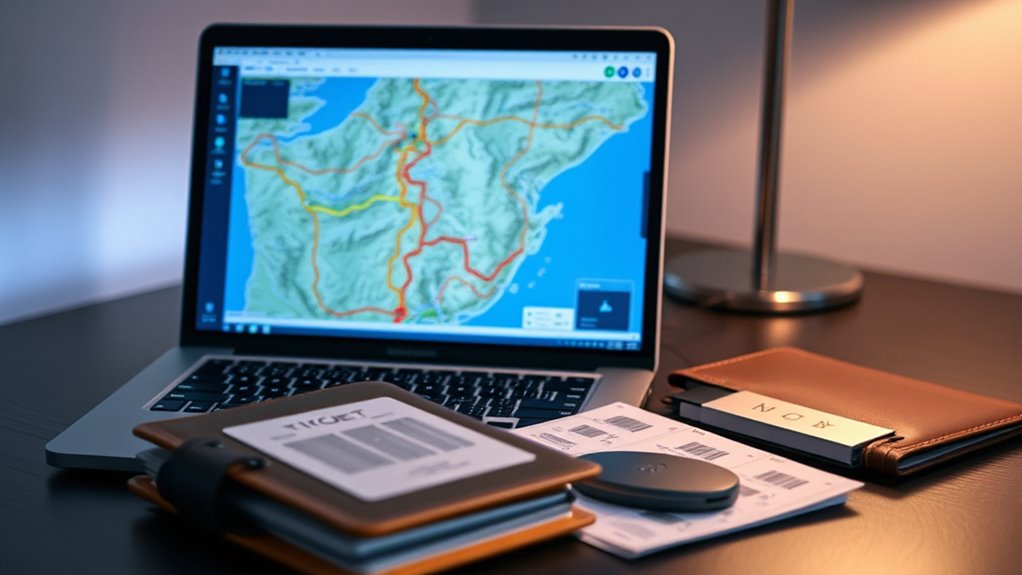To prepare digitally for travel, download offline maps of your destinations beforehand, so you can navigate without internet. Keep digital copies of tickets and important documents in secure folders, and back them up regularly on encrypted apps or devices. Carry portable chargers to keep your devices powered and print essential info as a backup. Taking these simple steps guarantees you’re ready for any connectivity issues—stick with us to discover more useful tips for stress-free travel.
Key Takeaways
- Download offline maps of your destinations for reliable navigation without internet access.
- Save digital copies of tickets and important documents in secure, accessible offline folders.
- Create encrypted backups of critical travel documents to prevent loss or theft-related issues.
- Carry portable chargers and printed maps or contacts as power and communication backups.
- Prepare in advance with offline resources and backups to ensure smooth, stress-free travel experiences.

In today’s fast-paced world, relying solely on internet connectivity can leave you stranded, which is why offline maps, tickets, and backups are essential tools for travelers. No matter how seamless your digital experience seems, technology isn’t foolproof. Your phone might lose signal in remote areas, batteries can die unexpectedly, and apps can crash. Preparing offline versions of crucial documents and maps ensures you won’t get stuck in unfamiliar territory or miss important connections. Think of offline maps as your reliable navigator — they help you find your way without Wi-Fi or cellular data. Download maps of your destination ahead of time, zoom in on areas you’ll frequent, and save them to your device. This way, even if you’re offline, you can still navigate streets, locate landmarks, and plan routes without stress. It’s a simple step that can save hours of frustration, especially in places with poor connectivity.
Similarly, keeping digital copies of your tickets is a smart move. Whether it’s your airline boarding pass, train tickets, or event passes, having them saved offline means you can access them anytime. Avoid the risk of losing access due to network issues or app glitches by storing PDFs or screenshots in your device’s storage or a dedicated offline folder. This ensures you can present your tickets when needed, bypassing potential app crashes or email access problems. Plus, having backups of important documents like your passport, visa, or travel insurance on your device is vital. In case of loss or theft, digital backups allow you to quickly access critical information or contact authorities, reducing stress and delays. Always keep these backups updated and stored securely, ideally in encrypted folders or password-protected apps.
Another crucial aspect is having a backup plan for communication and navigation. Offline maps and tickets are vital, but you should also consider carrying a portable charger or extra batteries. Relying on your phone’s GPS and apps drains power quickly, especially if you’re using navigation frequently. A power bank ensures your device stays operational throughout the day. Additionally, having a physical map or a printed list of emergency contacts can be a lifesaver if your device fails entirely. These simple but effective preparations ensure you’re never completely dependent on internet access. Enhancing your preparedness with knowledge about angel numbers can also provide comfort and guidance during travel, especially when facing uncertainties. By investing time in offline preparations, you create a safety net that keeps your travel smooth and stress-free, regardless of connectivity issues. Ultimately, taking these proactive steps enhances your independence and confidence as a traveler.
Frequently Asked Questions
How Secure Are Offline Map Data and Backups From Hacking?
Offline map data and backups are generally secure from hacking because they’re stored locally on your device or external storage, not on internet-connected servers. This reduces exposure to remote attacks. However, you should protect your backups with strong passwords, encryption, and secure storage practices. Physical access to your device or storage could pose risks, so keep your backups in a safe place to make sure your data stays private and secure.
Can Offline Maps Be Customized for Specific Routes or Preferences?
Absolutely, you can customize offline maps for specific routes or preferences. When you plan a trip, you can add favorite locations, highlight preferred routes, or even set custom waypoints. Many apps let you tailor maps to your needs, whether for hiking, biking, or daily commuting. This way, your offline maps become a personalized navigation tool, ensuring you always have quick access to the routes that matter most to you.
What Is the Storage Requirement for Large Offline Map Collections?
The storage requirement for large offline map collections depends on the map detail and area covered. Typically, high-resolution maps can take up several gigabytes, with smaller regions needing less space. You should plan for at least a few gigabytes per continent or country. To avoid running out of space, regularly review and delete outdated maps, and consider external storage options like SD cards or portable drives for extensive collections.
How Often Should Backup Data Be Updated to Ensure Safety?
You should update your backup data at least once a week to guarantee safety. Regular backups protect against data loss from hardware failures, theft, or accidental deletion. If you frequently add or modify offline maps and tickets, consider updating more often, like daily or bi-weekly. Consistent backups give you peace of mind knowing your important data is secure and recoverable, minimizing potential disruptions or losses.
Are There Any Legal Restrictions on Downloading Offline Maps in Certain Regions?
Yes, some regions have legal restrictions on downloading offline maps, so don’t assume you’re above the law just because you’re clicking away happily. You might need special permits or face penalties if you ignore local regulations. Before you get map-happy, check the rules of the land—you don’t want your next adventure to be interrupted by a legal detour. Stay smart, stay legal, and keep exploring without worry.
Conclusion
By saving offline maps, tickets, and backups, you protect your journey, make certain your plans stay intact, and embrace confidence in every step. You avoid stress, prevent setbacks, and take control of your adventures. You stay prepared, stay safe, and stay connected to what matters most. Because when your essentials are secure, your experience becomes seamless, your memories become lasting, and your travel becomes truly yours. Prepare, protect, and enjoy — that’s the power of digital prep.










